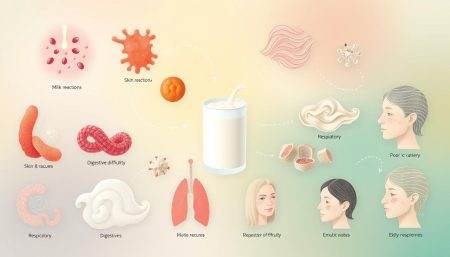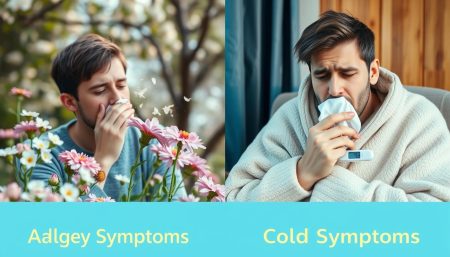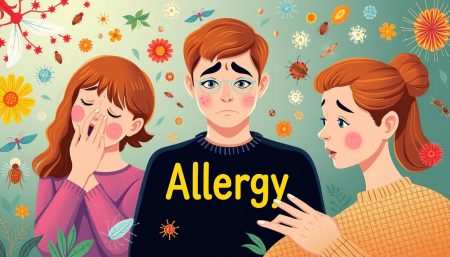Caffeine is a big part of our daily lives, giving us energy and focus. But for some, it can cause serious allergy symptoms. Knowing the signs of caffeine allergy is key to staying healthy.
An allergic reaction to caffeine is not just a minor issue. It’s a serious concern for those who experience it. This topic is important for those dealing with allergies and for anyone who cares about their health.
Key Takeaways
- Identifying caffeine allergy symptoms can prevent potential health risks.
- Differentiation between allergies and sensitivities is vital for proper management.
- Mild to severe allergic reactions to caffeine necessitate varying degrees of response.
- Awareness of signs of caffeine allergy contributes to better health outcomes.
- Cultivating knowledge about one’s reactions to caffeine fosters safer consumption habits.
Understanding Caffeine Allergy
Caffeine is a stimulant found in coffee, tea, and energy drinks. It can cause reactions in some people. These reactions can range from mild to severe, known as caffeine allergy. This is different from caffeine intolerance or general caffeine sensitivity symptoms.
What Constitutes a Caffeine Allergy?
A true caffeine allergy happens when the immune system sees caffeine as a threat. It acts like it’s fighting off a pathogen. This can cause symptoms like skin rashes or more serious reactions. These reactions are part of the adverse reactions to caffeine that make it different from just being sensitive or intolerant.
Distinguishing Between Allergy and Intolerance
It’s important to know the difference between a caffeine allergy and intolerance. An allergy involves the immune system and can be dangerous, even life-threatening. On the other hand, intolerance causes milder symptoms like stomach upset. It doesn’t involve the immune system. Knowing the difference helps in treating and avoiding caffeine correctly.
Common Signs of Caffeine Allergy
Finding out if you have a caffeine allergy can be tricky. Caffeine is in many foods and drinks we use every day. But, there are clear signs of a caffeine allergy, like skin reactions and discomfort.
Caffeine Allergy Rash: Recognizing the Signs
A common sign of caffeine allergy is a rash on the skin. These rashes are red, swollen, and might itch or burn. They can show up right after you drink something with caffeine and get worse if you keep drinking it.
- Itchiness
- Redness
- Swelling or inflammation
Caffeine Allergy Hives: Identifying and Managing
Hives from caffeine allergy, or urticaria, are another clear sign. These are red, raised welts on the skin that can itch a lot. To deal with these symptoms, you need to stop drinking caffeine and might need to see a doctor for relief.
| Symptom | Appearance | Immediate Action |
|---|---|---|
| Hives | Red and raised welts | Apply antihistamine cream |
| Rash | Red, inflamed skin | Wash area with water, avoid scratching |
| Swelling | Puffiness on skin | Consult physician if severe |
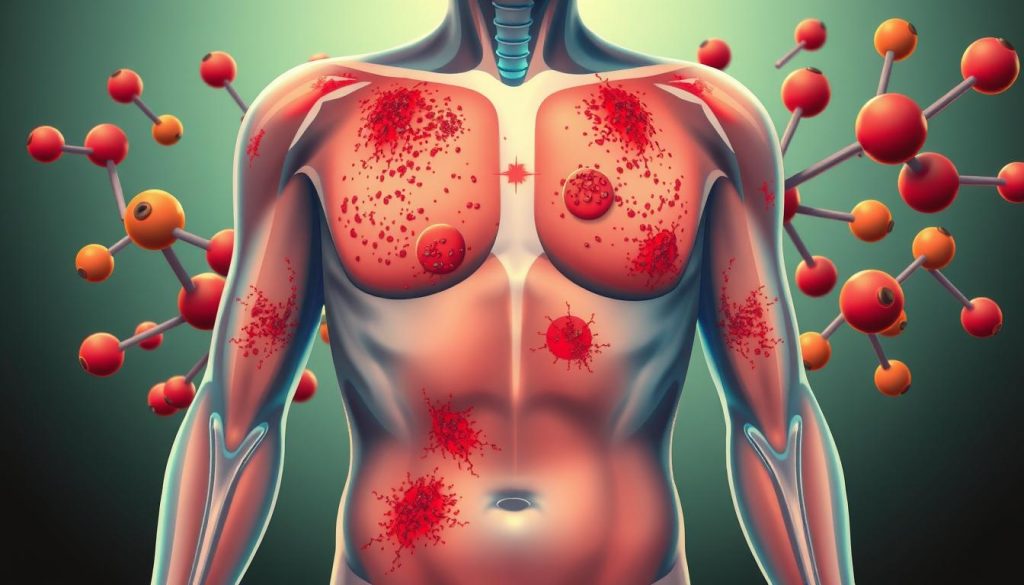
For many, spotting these signs of caffeine allergy is the first step to managing it. Staying away from caffeinated items, using the right medicine, and talking to a doctor are key steps to stop more allergic reactions.
Caffeine Allergy Symptoms Unveiled
Knowing the signs of a caffeine allergy is important. This is especially true for those who react badly to caffeine. Let’s look at the symptoms that might show you have a caffeine allergy.
- Immediate skin reactions: You might see hives, itching, or swelling around your lips and eyes.
- Digestive disturbances: You could feel stomach pain, nausea, vomiting, or diarrhea after drinking caffeine.
- Respiratory issues: Wheezing, trouble breathing, or feeling tight in the chest are common.
- Cardiovascular reactions: A fast heartbeat or palpitations can happen if you’re sensitive to caffeine.
- Neurological symptoms: Headaches, dizziness, and feeling off mentally are signs of a caffeine allergy.
If you’re experiencing these symptoms, see a doctor. They can help figure out if you have a caffeine allergy. Getting the right treatment is important.
It’s important to know how caffeine affects you. Pay attention to when and how symptoms show up. This can help you manage a caffeine allergy.
| Symptom Category | Examples |
|---|---|
| Skin Reactions | Hives, itching, swelling |
| Digestive Issues | Nausea, vomiting, diarrhea |
| Respiratory Difficulties | Shortness of breath, wheezing |
| Heart-Related Symptoms | Palpitations, rapid heartbeat |
| Neurological Effects | Headaches, dizziness |
In short, knowing about caffeine allergy symptoms is crucial. Being aware and taking action can help manage side effects.
Immediate Allergic Reactions to Caffeine
Anaphylaxis from caffeine is rare but very dangerous. It needs quick action to handle. This part talks about the serious reactions to caffeine and how to spot and deal with them fast.
Recognizing Anaphylactic Responses
Anaphylaxis from caffeine shows up with scary signs like trouble breathing and a big drop in blood pressure. It can happen fast, in just minutes. Spotting these signs early is key to saving lives.
Emergency Treatment for Severe Allergic Reactions
Dealing with severe allergic reactions to caffeine means acting fast. This usually means giving epinephrine right away. Then, call for emergency help and watch closely for more signs.
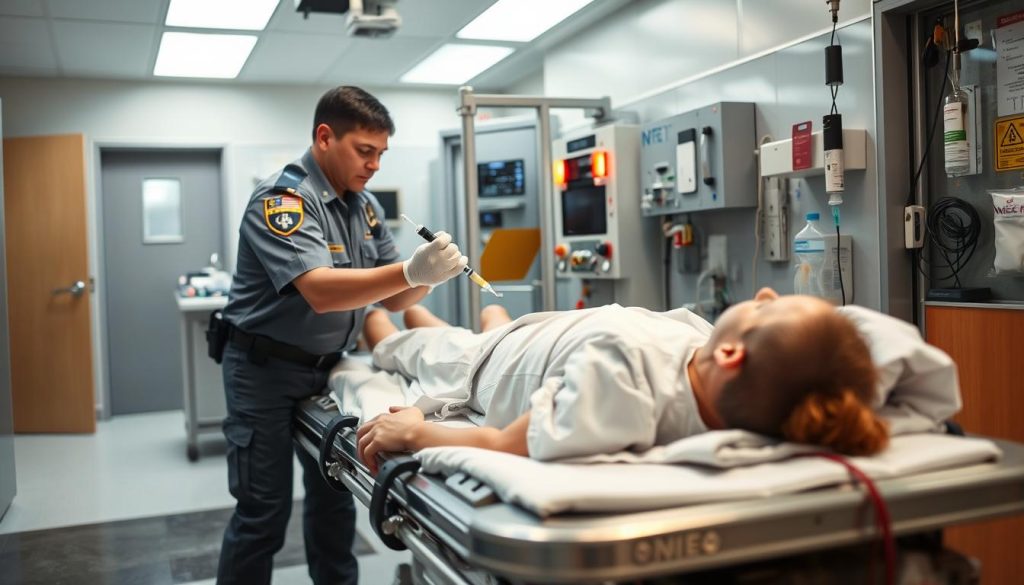
Knowing how to act in emergency situations is very important. It can help save lives. Understanding these steps can be a big help in urgent situations.
- Recognize the symptoms
- Give epinephrine right away
- Call for emergency help
- Keep watching for more signs
Being ready for these serious health issues is important for everyone. It’s not just for people who know they’re sensitive to caffeine. It’s also for people in public places where these reactions might happen unexpectedly.
Caffeine Intolerance Signs to Watch For
Spotting caffeine intolerance signs means looking for small but clear symptoms. These signs are not as severe as allergic reactions but can still affect your day. Knowing these signs helps you decide how much caffeine is safe for you.
- Jitters and nervousness: Feeling too restless after drinking caffeine is a common sign.
- Heart palpitations: A sudden, uncomfortable increase in heart rate after caffeine is another sign.
- Upset stomach: Caffeine can make stomach problems like acid reflux and irritation worse.
- Headaches: Too much or too little caffeine can lead to severe headaches or migraines.
- Insomnia: Trouble sleeping, even hours after drinking caffeine, is a sign too.
It’s important to see these symptoms as caffeine intolerance signs and not just side effects. If you keep having adverse reactions to caffeine, talk to a doctor. They can help you manage your symptoms.
Key Differences: Allergy vs. Sensitivity
It’s important to know the difference between caffeine allergy symptoms and caffeine sensitivity symptoms. Allergies cause a strong immune reaction. Sensitivities lead to milder symptoms, often affecting the stomach.
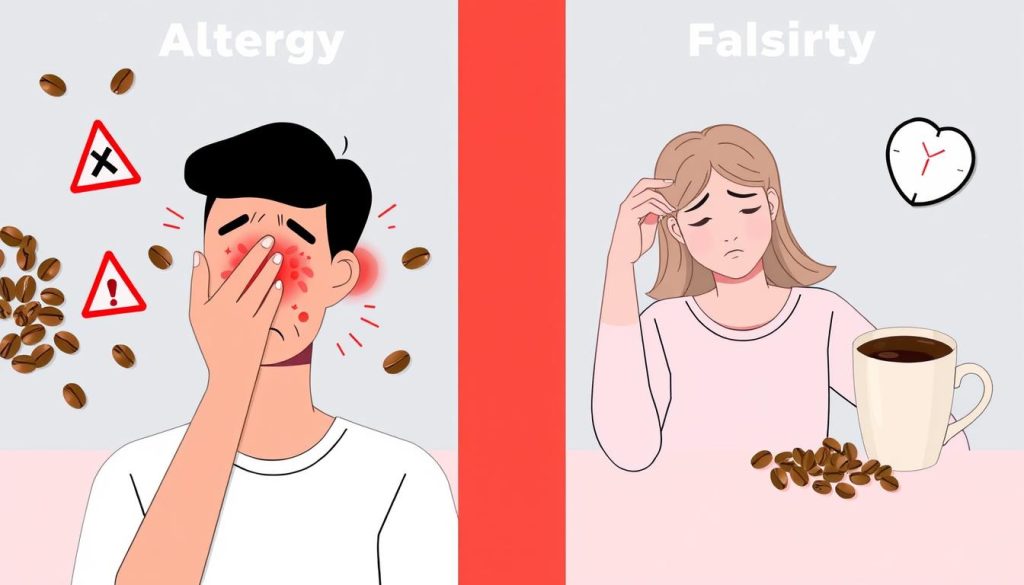
Knowing these differences helps people understand their symptoms better. It also helps them find the right medical help. Here’s a quick comparison of both conditions:
| Condition | Symptoms | Diagnosis | Management |
|---|---|---|---|
| Allergy | Swelling, hives, respiratory issues | Skin prick test, IgE antibody assessment | Avoidance of caffeine, possible use of antihistamines |
| Sensitivity | Headaches, irritability, digestive discomfort | Elimination diet, observation of symptom response | Limiting caffeine intake, dietary adjustment |
If you think you have an allergy or sensitivity, keep a record of your symptoms. This information is key. It helps doctors give you the best advice for managing your condition.
Adverse Reactions to Caffeine
Many people enjoy the effects of caffeine without problems. But, some face adverse reactions that go beyond typical allergy symptoms. These can really affect daily life and show up in different ways.
Gastrointestinal Symptoms Linked to Caffeine
One common issue is how caffeine affects the stomach. Symptoms can be mild or severe, depending on how sensitive someone is:
- Nausea and vomiting
- Acid reflux or stomach upset
- Increased bowel movements or diarrhea
These stomach problems often make people avoid caffeinated drinks. Cutting down or choosing caffeine-free options can help.
Neurological Impact of Caffeine Exposure
Caffeine’s effects on the brain vary from person to person. While it can boost alertness and focus for some, others might face:
- Insomnia or disrupted sleep patterns
- Restlessness and nervousness
- Headaches and dizziness
- Increased heart rate and anxiety
Spotting these signs early and knowing how caffeine affects you is key. Cutting back, sticking to daily limits, or talking to a doctor are smart steps for those with negative reactions.
Caffeine Allergy Headache: A Notable Symptom
Ever had a headache after drinking caffeinated drinks? It might be a sign of a caffeine allergy. This headache is different from usual tension or migraine headaches.
Caffeine allergy headache shows unique signs. It’s sharp and can come with itching or swelling, like an allergic reaction.

To understand caffeine allergy headache, let’s compare it with other headaches:
| Type of Headache | Symptoms | Typical Duration | Common Triggers |
|---|---|---|---|
| Caffeine Allergy Headache | Sharp, stabbing pain accompanied by other allergic symptoms | Varies; can last from 30 minutes to hours after caffeine intake | Intake of caffeine even in small amounts |
| Migraine | Pulsating, throbbing pain often on one side of the head; sensitivity to light and sound | 4 to 72 hours | Stress, hormonal changes, certain foods, and drinks without caffeine |
| Tension Headache | Mild to moderate dull pain like a band around the head | 30 minutes to a week | Stress, lack of sleep, poor posture |
Figuring out if your headache is from a caffeine allergy headache is key. It helps manage your symptoms and avoid wrong diet choices. If you get headaches with caffeine and other signs of caffeine allergy, see a doctor. They can confirm the allergy and suggest the right treatment.
Learning about this condition and knowing your limits is important. Getting medical advice helps manage caffeine sensitivity, especially when it causes headaches.
Caffeine Sensitivity Symptoms Explained
It’s important to know about caffeine sensitivity symptoms if you react badly to this common stimulant. Unlike caffeine allergy symptoms, which involve the immune system, caffeine sensitivity mainly affects the nervous system. This leads to various physical reactions.
Caffeine sensitivity symptoms can be mild or severe and affect your daily life. These symptoms are often confused with those of a caffeine allergy. But it’s key to know the difference because their treatments are quite different.
People with high caffeine sensitivity might feel jittery, have heart palpitations, or trouble sleeping even after a small amount of caffeine.
To better understand, here’s a table that shows the main symptoms of caffeine sensitivity and a true caffeine allergy:
| Caffeine Sensitivity Symptoms | Caffeine Allergy Symptoms |
|---|---|
| Increased heart rate | Skin hives or rashes |
| Nervousness or anxiety | Swelling of lips or tongue |
| Upset stomach | Difficulty breathing |
| Insomnia | Anaphylaxis in severe cases |
This comparison helps with self-diagnosis and knowing when to see a doctor. Understanding caffeine sensitivity symptoms helps manage caffeine intake. This improves your life quality and lowers health risks.
Allergic Reaction to Caffeine
An allergic reaction to caffeine isn’t just about physical signs like rashes. It can also affect your mind and feelings. We’ll explore how it changes your mood and how to handle these symptoms.
Psychoactive Effects and Mood Changes
Some people with a caffeine allergy might feel mood swings and mental issues. These can include feeling anxious, irritable, or even a bit depressed. Being more sensitive to caffeine can make these feelings worse, impacting your mental health.
How to Identify and Manage Allergic Skin Reactions
Spotting caffeine allergy symptoms on your skin is key to managing it. Look out for redness, itching, and swelling. To deal with these signs, stop drinking caffeine and talk to a doctor. They might prescribe antihistamines or corticosteroids to help your skin.
Handling allergic reactions to caffeine means looking at all symptoms, including emotional and mental ones. This way, you can better understand and manage your reactions. It helps you make smart choices about your health and well-being.
Recognizing Behavioral Changes Linked to Caffeine
It’s important to notice changes in behavior when thinking about caffeine allergy symptoms. People might feel mood swings or act differently, which could mean they have a caffeine allergy. Knowing these signs helps them manage their allergies better.
Mental Alertness or Anxiety: Finding the Balance
Caffeine is known for making us feel more alert. But for some, it can cause too much anxiety. It’s key to know when it’s helping and when it’s causing harm. Symptoms can range from feeling jittery to having panic attacks, which are clear signs of an allergy.
Impact on Sleep Patterns and Rest
Caffeine can also mess with sleep. If it leads to insomnia or restless nights, it might be a sign of an allergy. Caffeine sensitivity can really hurt how well you sleep, which is essential for health. Watching how your sleep changes after drinking caffeine can help spot allergies.
Looking at these behaviors helps people understand how caffeine affects them. This knowledge lets them make better choices about what they drink.
The Role of Genetics in Caffeine Allergy
Looking into the genetic roots of caffeine allergy reveals why some people react to it. Studies show that certain genes might make some more likely to have bad reactions to caffeine. Knowing this helps doctors find better ways to help those affected.
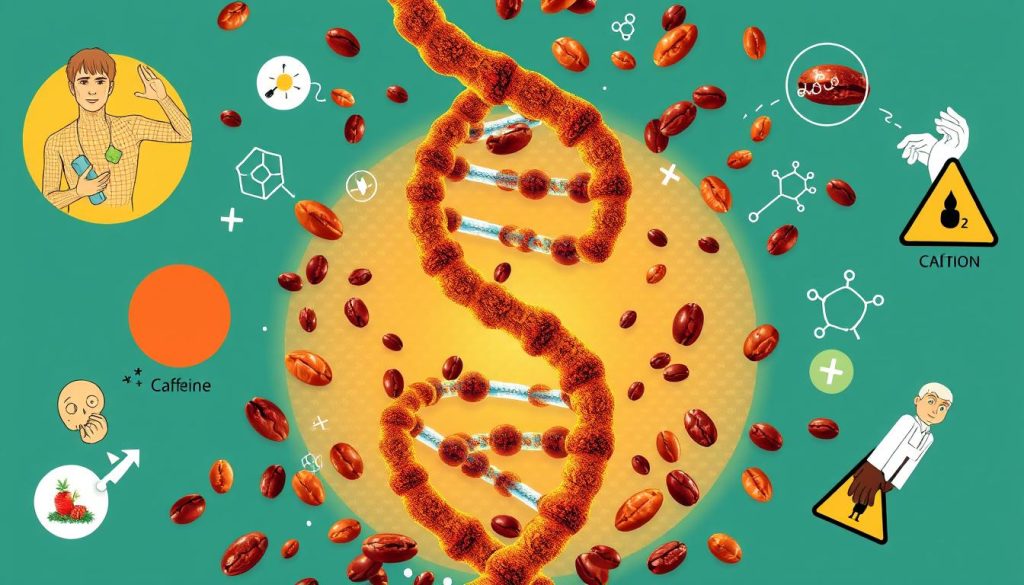
Genetics are key in how our bodies handle caffeine. Some genes can make caffeine stay in our system longer. This can lead to more people getting caffeine allergy symptoms. So, checking genes is important for managing and figuring out caffeine reactions.
Research shows a big genetic part in how caffeine is broken down. This can make allergic reactions worse in some people.
| Gene | Impact on Caffeine Metabolism | Associated Allergy Risk |
|---|---|---|
| CYP1A2 | Primary enzyme for caffeine metabolism; variations can slow caffeine breakdown | Higher risk of prolonged caffeine effects and sensitivity |
| ADORA2A | Linked to caffeine’s stimulatory effects; mutations can increase susceptibility to insomnia from caffeine | Increased likelihood of insomnia and related caffeine allergy symptoms |
The link between genetics and caffeine allergy is crucial for doctors and researchers. It’s a key area of study that could lead to more tailored healthcare. Knowing these genetic links helps figure out who’s at risk and how to avoid caffeine allergy symptoms.
Exploring Treatment Options for Caffeine Allergy
Managing a caffeine allergy can be done in many ways. It ranges from simple lifestyle changes to getting medical help for serious cases. Knowing the caffeine allergy treatment options is key for those affected. We will look at methods that help control symptoms and improve life quality.
First, it’s important to know and avoid caffeine sources. This means not just coffee and tea but also some medicines and chocolate. For more on caffeine’s effects and sources, check out this detailed guide.
- Avoiding caffeine-contained products
- Substituting with caffeine-free alternatives
- Reading labels carefully to prevent accidental intake
For serious reactions, caffeine allergy treatment might need medicine. Antihistamines can help with hives or itching. For more severe reactions, epinephrine might be needed.
- Consult with healthcare providers to understand suitable medications.
- Carry prescribed epinephrine injectors for emergencies.
- Regularly review treatment plans with a professional.
| Strategy | Purpose | Effectiveness |
|---|---|---|
| Avoidance of Caffeine | Prevent initial allergic reaction | High |
| Antihistamines | Manage mild to moderate symptoms | Medium to High |
| Epinephrine | Treat severe allergic reactions | Essential |
Creating a personal plan with doctors is crucial for managing caffeine allergy. This includes regular check-ups and adjusting treatments as needed. Learning to spot early signs of an allergic reaction can greatly improve outcomes and give peace of mind.
Understanding and using effective caffeine allergy treatment plans helps those affected live safer, healthier lives. It also helps them manage their condition well.
Preventing and Managing Caffeine Allergy
Managing a caffeine allergy requires careful steps and lifestyle changes. It’s important to know how to avoid symptoms. Safe drinking habits and trying caffeine-free options are key to a healthy life.
Safe Consumption Practices
To prevent caffeine allergy, it’s vital to know your limits. People sensitive to caffeine should watch their intake. This means avoiding high-caffeine drinks like some teas, coffee, and energy drinks.
Alternatives to Caffeine
Looking for caffeine alternatives is a smart move. It helps cut down caffeine without losing out on enjoyment. Herbal teas, decaf drinks, and chicory coffee are great choices for those avoiding caffeine.
- Herbal teas offer a range of flavors and health benefits without containing caffeine.
- Decaffeinated coffee provides the coffee experience with minimal caffeine.
- Chicory coffee, made from the roots of the chicory plant, is a flavorful caffeine-free alternative.
| Beverage | Caffeine Content | Recommended For |
|---|---|---|
| Regular Coffee | 95 mg per cup | Not recommended for caffeine sensitive individuals |
| Decaffeinated Coffee | 2 mg per cup | Those reducing caffeine intake |
| Herbal Tea | 0 mg | Those avoiding caffeine |
| Chicory Coffee | 0 mg | Those looking for coffee taste without caffeine |
Using these caffeine allergy management tips can prevent allergic reactions. It also supports overall health. These strategies are great for those sensitive to caffeine and looking for a healthier lifestyle.
Conclusion
We’ve explored the complex world of caffeine allergy symptoms. We’ve looked at how they show up, how to figure out if you have one, and why it’s so important to deal with it. From annoying hives to serious anaphylactic reactions, knowing how caffeine affects you is key to staying healthy.
Knowing about caffeine allergy gives you power. It lets you spot symptoms early and find ways to handle them. You might change what you eat, find other energy boosters, or talk to doctors for advice. This way, you can enjoy your favorite drinks while keeping your body safe.
If you’re dealing with a caffeine allergy, don’t worry. There are ways to manage it. The tips and stories we’ve shared, along with doctor’s advice, can help. Living with an allergy shows your strength and the value of making smart choices.
FAQ
Q: What are the symptoms of caffeine allergy?
A: Symptoms of caffeine allergy include skin rashes, hives, headaches, and trouble breathing. In severe cases, it can lead to anaphylaxis. If you have an allergic reaction, seek medical help right away.
Q: How can I differentiate between caffeine allergy and intolerance?
A: Caffeine intolerance usually causes mild symptoms like stomach discomfort, jitteriness, or trouble sleeping. A caffeine allergy can cause a stronger immune response, like hives or anaphylaxis. A doctor can tell you if you have an allergy or intolerance.
Q: What should I do if I suspect a caffeine allergy?
A: If you think you have a caffeine allergy, see a healthcare professional. They might suggest allergy tests or an elimination diet. They’ll also guide you on how to manage it.
Q: How common are severe allergic reactions to caffeine?
A: Severe reactions like anaphylaxis from caffeine are rare but serious. They need immediate treatment. Always check with your doctor for advice.
Q: What are some signs of caffeine intolerance?
A: Signs of caffeine intolerance include feeling restless, heart palpitations, dizziness, and stomach upset. Some might feel more anxious or have trouble sleeping after drinking caffeine. These symptoms are usually milder than an allergic reaction.
Q: Could genetics play a role in caffeine allergy?
A: Yes, your genes might affect your risk of a caffeine allergy or sensitivity. Certain genes can change how your body processes caffeine, leading to adverse reactions.
Q: Can a caffeine allergy trigger headaches?
A: Yes, headaches can be a sign of a caffeine allergy. But, caffeine withdrawal can also cause headaches. It’s important to know the context of the headache to figure out the cause.
Q: What treatment options are available for those with a caffeine allergy?
A: Treatment for caffeine allergy means avoiding caffeine and possibly taking antihistamines for symptoms. For anaphylaxis, emergency treatment with epinephrine is needed. Always work with your doctor to create a treatment plan.
Q: Are there alternatives to caffeine that won’t trigger an allergy?
A: Yes, there are caffeine-free options like herbal teas, flavored water, or drinks with adaptogens. Talk to a healthcare provider or nutritionist to find the best choice for you.
Q: What are some long-term strategies for managing caffeine allergy?
A: Managing caffeine allergy long-term means avoiding caffeine products and reading labels. It also means educating yourself about hidden caffeine sources. Some people may need to work with an allergist for ongoing support.













